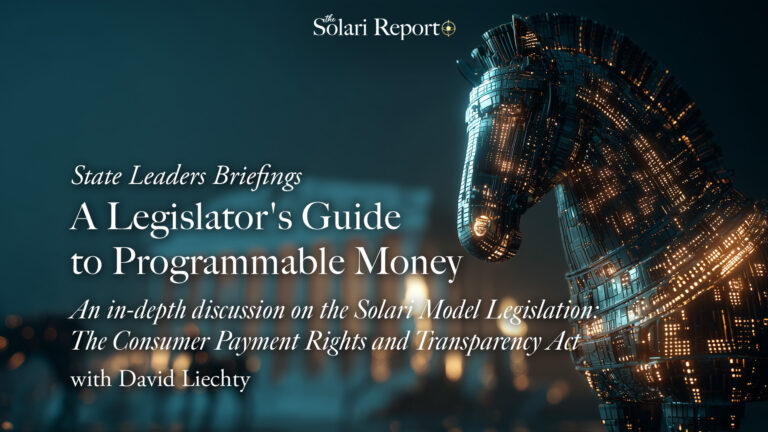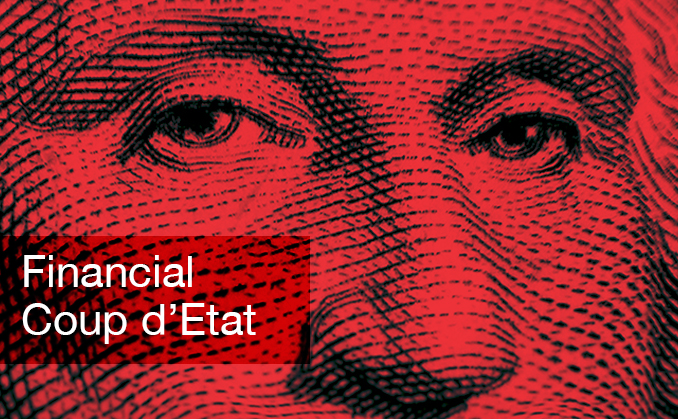In light of recent events, I am republishing.]
By Catherine Austin Fitts
In the fall of 2001 I attended a private investment conference in London to give a paper, The Myth of the Rule of Law or How the Money Works: The Destruction of Hamilton Securities Group.
The presentation documented my experience with a Washington-Wall Street partnership that had:
- Engineered a fraudulent housing and debt bubble;
- Illegally shifted vast amounts of capital out of the U.S.;
- Used “privitization” as a form of piracy – a pretext to move government assets to private investors at below-market prices and then shift private liabilities back to government at no cost to the private liability holder.
Other presenters at the conference included distinguished reporters covering privatization in Eastern Europe and Russia. As the portraits of British ancestors stared down upon us, we listened to story after story of global privatization throughout the 1990s in the Americas, Europe, and Asia.
Slowly, as the pieces fit together, we shared a horrifying epiphany: the banks, corporations and investors acting in each global region were the exact same players. They were a relatively small group that reappeared again and again in Russia, Eastern Europe, and Asia accompanied by the same well-known accounting firms and law firms.
Clearly, there was a global financial coup d’etat underway.
The magnitude of what was happening was overwhelming. In the 1990’s, millions of people in Russia had woken up to find their bank accounts and pension funds simply gone – eradicated by a falling currency or stolen by mobsters who laundered money back into big New York Fed member banks for reinvestment to fuel the debt bubble.
Reports of politicians, government officials, academics, and intelligence agencies facilitating the racketeering and theft were compelling. One lawyer in Russia, living without electricity and growing food to prevent starvation, was quoted as saying, “We are being de-modernized.”
Several years earlier, I listened to three peasant women describe the War on Drugs in their respective countries: Colombia, Peru, and Bolivia. I asked them, “After they sweep you into camps, who gets your land and at what price?” My question opened a magic door. They poured out how the real economics worked on the War on Drugs, including the stealing of land and government contracts to build housing for the people who are displaced.
At one point, suspicious of my understanding of how this game worked, one of the women said, “You say you have never been to our countries, yet you understand exactly how the money works. How is this so?” I replied that I had served as Assistant Secretary of Housing at the US Department of Housing and Urban Development (HUD) in the United States where I oversaw billions of government investment in US communities. Apparently, it worked the same way in their countries as it worked in mine.
I later found out that the government contractor leading the War on Drugs strategy for U.S. aid to Peru, Colombia and Bolivia was the same contractor in charge of knowledge management for HUD enforcement. This Washington-Wall Street game was a global game. The peasant women of Latin America were up against the same financial pirates and business model as the people in South Central Los Angeles, West Philadelphia, Baltimore and the South Bronx.
Later, courageous reporting by several independent investigative reporters confirmed in detail that the privatization and economic warfare model I discussed in London had deep roots in Latin America.
We were experiencing a global “heist”: capital was being sucked out of country after country. The presentation I gave in London revealed a piece of the puzzle that was difficult for the audience to fathom. This was not simply happening in the emerging markets. It was happening in America, too.
I described a meeting that had occurred in April 1997, more than four years before that day in London. I had given a presentation to a distinguished group of U.S. pension fund leaders on the extraordinary opportunity to re-engineer the U.S. federal budget. I presented our estimate that the prior year’s federal investment in the Philadelphia, Pennsylvania area had a negative return on investment.
We presented that it was possible to finance places with private equity and re-engineer the government investment to a positive return and, as a result, generate significant capital gains. Hence, it was possible to use U.S. pension funds to significantly increase retirees’ retirement security by successfully investing in American communities, small business and farms — all in a manner that would reduce debt, improve skills, and create jobs.
The response from the pension fund investors to this analysis was quite positive until the President of the CalPERS pension fund — the largest in the country — said, “You don’t understand. It’s too late. They have given up on the country. They are moving all the money out in the fall [of 1997]. They are moving it to Asia.”
Sure enough, that fall, significant amounts of moneys started leaving the US, including illegally. Over $4 trillion went missing from the US government. No one seemed to notice. Misled into thinking we were in a boom economy by a fraudulent debt bubble engineered with force and intention from the highest levels of the financial system, Americans were engaging in an orgy of consumption that was liquidating the real financial equity we needed urgently to reposition ourselves for the times ahead.
The mood that afternoon in London was quite sober. The question hung in the air, unspoken: once the bubble was over, was the time coming when we, too, would be “de-modernized?”
In 2009 — more than seven years later — this is a question that many of us are asking ourselves.
Part II: Rethinking Diversification
Related Reading:
Dillon, Read & Co. Inc. and the Aristocracy of Stock Profits





















































































































Interesting, especially the references tot he Bilderberg group. Dutch papers have recently complained bitterly about the staff of the Dutch Queen – daughter of Prince Bernhard – running her relatives’ tax evading trusts. A further interesting point is that the Dutch Crown Prince is constructing a palace in Mozambique….. Any other hints that the end is nigh?
What financial Coup d’etat? Who hatched it and who benefited from it? You guys are all subscribing to a myth. There is no organized conspiracy going on. Who has reaped any rewards when wealth has been destroyed at an unprecedented scale? The reasons for the present malaise are pretty clear and well documented by now. There is plenty of blame to go around. We don’t have to look for any puppet master hiding behind the curtain.
If unfettered free market capitalism is left to its shenanigans, like it has been, we are bound to see excesses and busts. It is human nature and free market capitalism, without sensible oversight, mimics human nature. Money has gone global. It will travel to wherever it finds good returns with safety. International money quickly finds local partners who command political clout. If unfair advantages have been taken, it is because of the complicity of power and money. Both walk hand in hand.
In the present financial meltdown, the smartest financiers around the world have lost their shirts and the Ivy league graduates running things are loosing their jobs. The global crisis has spared no one. So, can somebody please tell me who are the ringleaders of the so-called Coup D’etat and where are they hiding their plunder?
Sorry, Gumnann, your spin does not hold. If I want to control all the people and tangible assets in the world, I don’t care what the price is in paper dollars. Indeed, my control increases on the dumps. Yes, tons of people are laid off. They are only needed in the pumps. They are expendable in the dumps.
You should read the European Union lawsuit motions against RJR Nabisco in http://www.dunwalke.com
I think it was Rhett Butler, in Gone with the Wind, who said something along the lines of, ” There is much profit in building society. There is even more in destroying it.”
I don’t think it really wise to say evil cannot be comprehended though. That only further empowers those who are and encourages those who desire to be.
Stalin and Hitler both came from the fringes of society and normally would have remained there, but for the fact that their respective societies were totally upended and their lack of civil and social concerns enabled them to climb to the top of what remained because they had no compunction in destroying whatever structures blocked their path. Then again, Hitler’s greatest strategic mistake was to attack Russia. Having signed a non aggression pact, Stalin would have been likely to give Hitler whatever oil he needed to finish conquering the rest of western Europe and spent his time building up his own armies and focusing on Middle Eastern oil and whatever parts of China the Japanese didn’t want. Instead it was their very pathologies which prevented them from reaching compromises with each other. That is the political limitation of such people, that in their distrust and inability to connect and network, they cannot build larger civil structures beyond what they can control by brute force.
People have conquered the world because of their ability to cooperate, more than their ability to compete. We go from predator to parasite when we take much more than we give back. So now it is us vs. nature. We need to learn to reconnect to our environment and not just assume we are above and better than everything else. That means understanding how nature functions and not allowing our mythologies of our own divinity to get in the way.
There is no one “in charge”.
While many people wish to ascribe all our troubles to someone or some group, I don’t believe it does or can work that way.
Sure, there are dynastic powers who wield enormous influence across the globe, but they are not in control. Nor do they have to be.
Their objectives are as impersonal as that of a predator striking a herd. Is the predator in control? No, it reacts to opportunities and does what it was designed for without conscious planning, or remorse.
As such, there is no global plannning, no documentation of a grand stategy, no ultimate goal. There is no single point at which we can focus a defense.
Shakespeare knew how it worked ” Is there no one who will rid me of this turbulent priest”. An unguarded comment by a King leads to a death he did not really wish to occur.
What I am illuding to is that, rather than complex, ancient conspiracies, great consequences arise from very simple conversations. When you wield enormous power, a mere suggestion will ripple out from a single person and act upon huge resources and impact vast numbers of people. And those people will react in quite predictable ways ( in a general sense ).
There is no objective, no plan. The people wielding power do so because that is what they were raised to do, what they were trained to do.
Peter:
You say, “no one is in charge.” But could you prove that in a court of law? I could not prove it or disprove it.
It is essential to say that we don’t know when we don’t know. Everything I have experienced at the highest levels of government or business says that indeed there are folks in charge, including at the very top.
So, I don’t know. If you do and have hard evidence that can prove that no one is in charge, I would love to see it.
Otherwise, what you are saying is that you can not fathom that someone really is in charge.
Catherine
What a great group and writing by Catherine! I still cant read enough…and happy to know that there is such a group out there discussing these things.
To add on Catherine’s comment about political psycopaths, here is a great article:
http://www.strike-the-root.com/91/groves/groves1.html
Who are these people? I dont think families and bloodlines matter in modern times. What defines the MOTU is the common actions and interests they share. One of the best tests is whether they support or condemn Israel and its atrocities. The fact that not one person in the West who is in a position of power can even criticize Israel speaks volumes. The fact that key power positions in this country are occupied by supporters of Israel is evident to those who see. That most Americans are oblivious and ignorant of the fact that they have lost control of their country, and their men and resources are used for promoting the power of the MOTU is also evident. So the question I have is: Why is Israel the one common thing on which the MOTU and its slaves have absolute agreement?